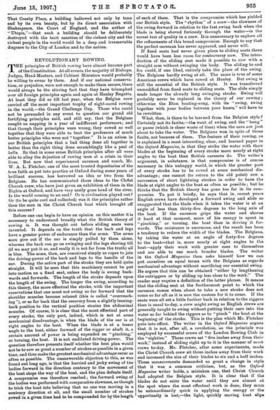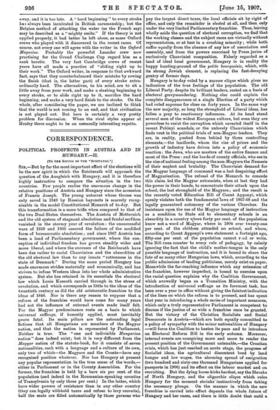REVOLUTIONARY ROWING.
THE principles of British rowing have almost become part of the Constitution. At all events, the majority bf Bishops, Judges, Head-Masters, and Cabinet Ministers would probably be willing to swear by them. And if our national conserva- tism, or prejudice, were not enough to make them secure, there would always be the stirring fact that they have triumphed over all foreign principles again and again at Henley Regatta. At least they did so till last year, when the Belgian crew carried off the most important trophy of eight-oared rowing in the world,—the Grand Challenge Cup. Those who could not be persuaded in any event to question our grand old fortifying principles said, and still say, that the Belgians caught us napping in a year of indifferent performers; and that though their principles were wrong, they rowed so well together that they were able to beat the professors of much better principles who were not" together." It is an axiom in our British principles that a bad thing done all together is better than the right thing done scramblingly like a peal of bells. So that in some sense British principles after all were ,able to allay the dejection of rowing men at a crisis in their lives. But now that experienced oarsman and coach, Mr. W. A. L. Fletcher, one of the most trusted depositaries of the true faith as put into practice at Oxford during some years of ,brilliant success, has borrowed an idea or two from the Belgians. He has communicated those ideas to the Meld , Church crew, who have just given an exhibition of them in the Eights at Oxford, and have very easily gone head of the river. Is the world coming to an end ? Or is civilisation played out? Or (to be quite cool and collected) was it the principles rather than the men in the Christ Church boat which brought off this success ?
Before one can begin to have an opinion on this matter it is necessary to understand broadly what the British theory of rowing is. It was thought out before eliding seats were invented. It depends on the truth that the back and legs have a greater power of endurance than the arms. The arms soon give out if the oar is simply pulled by them alone, whereas the back can go on swinging and the legs shoving till (if we may put it so, and really it is not far from the truth) all is blue. The arms, then, are conceived simply as ropes to join the driving-power of the back and legs to the handle of the oar. During the active part of the stroke they are held quite straight. It will be seen that this machinery cannot be put Into motion on a fixed seat, unless the body is swung back- wards and forwards. The length of the stroke depends upon the length of the swing. The longer the swing, according to this theory, the more effectual the stroke, with the important reservations that one must not swing so far forward that the shoulder muscles become relaxed (this is called "overreach- ing "), or so far back that the recovery from a slightly leaning. back position to the vertical position strains the abdominal muscles. Of course, it is clear that the most effectual part of every stroke, the only part, indeed, which is not at some .mechanical disadvantage, is when the blade of the oar is at right angles to the boat. When the blade is at a lesser angle to the boat, either forward of the rigger or abaft it, a
certain amount of power is being expended on "pinching," or turning, the boat. It is not undiluted driving-power. The question therefore presents itself whether the best plan would not be to row as great a number of strokes as possible in a given time, and thus make the greatest mechanical advantage recur as often as possible. The unanswerable objection to this, as was found out long ago, is that the hurried and jerky swing of the bodies forward in the direction contrary to the movement of the boat stops the way of the boat, and the plan defeats itself. A compromise was therefore reached ; the forward swing of the bodies was performed with comparative slowness, as though to trick the boat into believing that no one was moving in a contrary direction at all, and the small number of strokes rowed in a given time had to be compounded for by the length
of each of them. That is the compromise which has yielded our British style. The " rhythm " of a crew—the slowness of the swing forward in relation to the fast swing back when the blade is being shoved furiously through the water—is the surest test of quality in a crew. Itis unnecessary to explore all the refinements of this broad compromise. Enough to say that the perfect oarsman has never appeared, and never will.
If fixed seats had never given place to sliding seats there would have been less room for controversy now. The intro- duction of the sliding seat made it possible to row with a, straight ium without swinging the body. The sliding to and fro could, if one liked, entirely take the place of the swing. The Belgians hardly swing at all. The same is true of some American crews which have rowed at Henley. But swing is still the essential of the British style. It was transferred unmodified from fixed seats to sliding seats. The slide simply made longer the already long swinging stroke. Swing will probably never be replaced in the theory of our rowing ; otherwise the Eton boating-song, with its "swing, swing together with your bodies between your knees," will have to be rewritten.
What, then, is there to be learned from the Belgian style P Certainly not its faults,—the want of swing, and the " hang " or pause (which is sheer waste of time) when the oars are just about to take the water. The Belgians won in spite of those faults, not because of them. The feature of their rowing, as is explained in a most interesting, clear, and learned paper in the Oxford Magazine, is that they strike the water with their blades at the beginning of every stroke more nearly at right angles to the boat than British oarsmen do. The writer's argument, in substance, is that compromise is of course necessary in this unhappy world, in which the greater part of every stroke has to be rowed at some mechanical dis- advantage; one cannot (to return to the old point) row a succession of short lightning strokes in order to have the blade at right angles to the boat as often as possible ; but he thinks that the British theory has gone too far in its com- promise. To put it briefly, he says that in recent years English crews have developed a forward swing and slide so exaggerated that the blade when it takes the water is at an angle of less than thirty-five degrees to the long axis of the boat. If the oarsman grips the water and shoves it hard at that moment, more of his energy is spent in "pinching," or turning, the boat than in driving it for- wards. The resistance is enormous, and the result has been a tendency to reduce the width of the blades. The Belgians, by taking the water at an angle of forty-five degrees to the boat—that is, more nearly at right angles to the boat—apply their work with greater ease to themselves and are able to use much broader blades. The writer in the Oxford Magazine then asks himself bow we can put ourselves on equal terms with the Belgians as regards mechanical advantage without sacrificing our essential swing. He argues that this can be obtained "either by lengthening the outriggers or by sliding up less close to the work." The reader may require a definition of the latter phrase. It means that the sliding seat at the furthermost point to which the oarsman comes when about to take a new stroke does not come so far aft as it is now the custom for it to come. If the seats were all set a little further back in relation to the riggers than is usual to-day, a crew might swing as English crews are generally taught to swing without putting their oars into the water so far behind the riggers as to " pinch " the boat at the beginning of the stroke. This is the plan which Mr. Fletcher puts into effect. The writer in the Oxford Magazine argues that it is not, after all, a revolution, as the principle was employed by successful crews of the London Rowing Club in the "eighties." Those crews sat "five inches away from their work," instead of sliding right up to it in the manner of most crews to•day. Mr. Fletcher, after some experiments, made the Christ Church crew sit three inches away from their work And increased the size of their blades to six and a half inches. These measurements demanded so great a change in style that it was a common criticism, but, as the Oxford Magazine writer holds, a mistaken one, that Christ Church had adopted the Belgian style. It is clear that if the blades do not seize the water until they are almost at the spot where the most effectual work is done, they must be extraordinarily quick in applying the energy or the opportunity is lost,—the light, quickly moving boat slips away, and it is too late. A " hard beginning" to every stroke has always been inculcated in British oarsmanship ; but the Belgian method of attacking the water (as the French say) may be described as a "mighty smite." If the theory is not applied properly, it had better be left alone, as some Oxford crews who played with it discovered in the recent races. Of course, not every one will agree with the writer in the Oxford Magazine. Probably the powerful Leander crew now practising for the Grand Challenge Cup regard him as a rank heretic. The very fast Cambridge crews of recent years have all made a practice of "sliding right up to their work." The Oxford writer, in response to that awkward fact, says that they counterbalanced their mistake by rowing the finish (that is, the latter part) of every stroke extra- ordinarily hard. The alternatives, to his mind, are to sit a little away from your work, and make a slashing beginning to every stroke, or to slide right up to it, sacrifice the hard beginning, and make a very hard finish to the stroke. On the whole, after considering the paper, we are inclined to think that the world is not coming to an end, and that civilisation is not played out. But here is certainly a very pretty .problem for discussion. When the rival styles appear at Henley there ought to be an untsually interesting regatta.







































 Previous page
Previous page